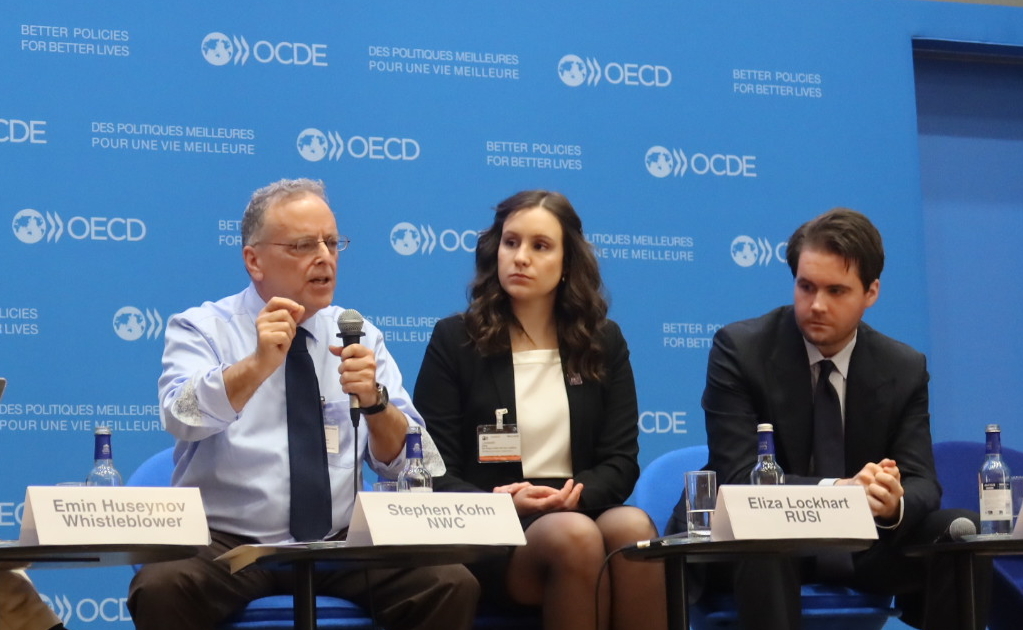Introduction
Corruption in Indonesia is a major problem, which can be found deep within the public sector. Mainly in the justice and services sector.
The justice sector, which includes the police and courts, is unable to enforce laws or uphold justice, which allows corruption to thrive. The public officials within the civil service sector have been accused of taking bribes, and even admitting to it.
Other types of corruption also exist in Indonesia, including embezzlement, extortion, and graft, which the investment sector of the government was most prone to.
Given the lack in ability to enforce the law, those who experience corruption have limited options for reporting their concerns to protect themselves and others.
However, some U.S. laws may apply to Indonesian whistleblowers who know of foreign corruption which includes a publicly traded company violating U.S. securities or commodities laws, or who is engaged in money laundering or other forms of corruption.
History of Corruption in Indonesia
Colonial Era
Corruption has existed in Indonesia for centuries and has become deeply embedded into society and politics. This all started back in the Dutch colonial period where local officials and citizens were exploited for personal gain. Bribery and nepotism were very prevalent during this time
Suharto Era
The New Order regime under President Suharto, which lasted from 1966 to 1998, was marked by corruption. Suharto and his associates amassed wealth through a system of patronage and nepotism, controlling key sectors of the economy and using their power to oppress citizens. This era is often associated with the “crony capitalism” that fueled corruption and inequality.
Post-Suharto Era
Following Suharto’s downfall in 1998, Indonesia embarked on a democratic transition. However, combating remains a significant challenge. This is due to deep-rooted cultural factors, weak institutions, and political patronage continue to hinder efforts to end corruption.
Types of Corruption in Indonesia
Indonesia has experienced a wide range of corruption and crime over the last few decades. Below are some of the most common:
- Embezzlement: Theft or misappropriation of funds or property by a person entrusted with their care, such as a political official.
- Extortion: The unlawful acquisition of money or other property by force, intimidation, or threats. Victims are motivated to give up things through fear of violence.
- Nepotism (and Cronyism): Granting treatment to family members, friends, or political allies, even if they are not qualified for such positions.
- Bribery: Offering or accepting money in exchange for favors or services.
- Conflict of Interest: Public officials using their positions for personal financial benefit. This might also include officials holding positions that create conflicts of interest, such as serving on both a government board and a private company.
- Money Laundering: Disclosing the sources of illegally obtained funds, often obtained from illegal activity, and slowly integrating them into the real economy.
- Tax Evasion: Intentionally reporting lower income or profits than actual amounts or failing to pay tax or file returns.
- Procurement Fraud: Conspiring with bidders to manipulate the outcome of a contacting process or receiving kickbacks in exchange for awarding contracts.
- Extortion: Using threats or coercion to obtain money or other benefits or exploiting official authority for personal gain.
- Abuse of Power: Using political power for personal gain.
These are just a few of the types of corruption that have been identified over the years. Some forms happen more often in one region or sector than others.
Major Corruption Cases of Indonesia
Corruption Charges Against Suharto (Post 1998)
Suharto, the former president of Indonesia, was not formally charged with corruption during his lifetime. However, there were numerous allegations that surfaced during his presidency, which led to the downfall of the New Order Regime.
Suharto was accused of crony capitalism, which is a form a favoritism where individuals in positions of power or authority provide preferential treatment, appointments, or advantages to friends, associates, or loyal supporters, regardless of their qualifications or merit.
It was also alleged that Suharto built his fortune through corrupt ways, such as selling state assets at below-market prices. It’s difficult to determine the truthfulness of these allegations, but many Indonesians today blame him for the current culture of corruption and economic inequality.
Bank Century Scandal (2008)
The Bank Century Bailout Scandal of 2008 involved the Indonesian government’s decision to inject Rp6.76 trillion (approximately US$710 million) into Bank Century, a private bank facing financial difficulties. The bailout was marred by allegations of corruption and mismanagement.
Key figures implicated in the scandal included former Bank Century president Robert Tantular, former Bank Indonesia deputy governors Budi Mulya and Siti Chodijah Fajriah, and other government officials.
It was alleged that more than US $1.5 billion was stolen from Bank Century and transferred overseas by Tantular and his associates. The scandal raised concerns about financial regulation, oversight, and government commitment to combating corruption in Indonesia.
Effects of Corruption in Indonesia
With corruption in Indonesia being deeply integral in politics and society, the long-term effects are quite damaging.
Widespread corruption can dissuade investors, which leads to slow economic growth. This often leads to an increase in inequality and poverty and diverts important funds away from key sectors such as education, healthcare, and infrastructure, leading to poor quality of life.
This type of corruption can often lead to a culture of impunity, which encourages crime and violence. This is currently the case, as the police and courts are unable to enforce the law. This culture of impunity leads to a lack of trust in government and its officials.
Lastly, and what might not seem like an effect of corruption, is the degradation of the environment. If corruption is allowed to flourish, industries can exploit such weaknesses. For instance, corruption can facilitate illegal logging and mining, leading to deforestation and environmental degradation, including pollution.
Anti-Corruption Efforts in Indonesia
The country has established anti-corruption agencies, such as the Corruption Eradication Commission (KPK), and implemented reforms to improve transparency and accountability. Below is an overview of some of the efforts in further detail:
- Corruption Eradication Commission (KPK): This agency has been instrumental in investigating and prosecuting corruption cases, often targeting high-level officials.
- National Anti-Corruption Agency (KNKK): This agency focuses on prevention and education, promoting transparency and accountability in government institutions.
- Legal Reforms: The Anti-Corruption and Public Disclosure Law provides a legal framework for combating corruption.
- Institutional Strengthening: Efforts have been made to improve the independence and efficiency of the judiciary, ensuring fair trials and impartial judgments.
- Grassroots Activism: Civil society organizations have played a crucial role in raising awareness of corruption and advocating for reforms.
- Collaboration with international organizations: Indonesia has cooperated with organizations like the UN and the World Bank to strengthen its anti-corruption efforts.
- Asset Recovery: Indonesia has worked to recover stolen assets held abroad, returning them to the country.
Indonesia has made progress over the last decade but continues to face challenges in its fight against corruption. Ongoing efforts are needed to maintain progress and ensure that anti-corruption measures are effective.
Indonesians Can Use U.S. Anti-corruption Laws
Indonesians may be eligible for awards and protection under certain U.S. laws.
For instance, the if the information they provide pertains to corruption involving a U.S. publicly traded company and a political official of Indonesia, they can use the Foreign Corrupt Practices Act (FCPA). If the information provided relates to money laundering, they may also be eligible for awards and protection. Continue reading to learn more about these programs.
Foreign Corrupt Practices Act (FCPA)
The Foreign Corrupt Practices Act (FCPA) is a U.S. law that prohibits any U.S. company or individual from paying bribes to or receiving bribes from foreign government officials.
In other words, the FCPA prohibits the offer, payment, or promise to pay money or anything of value to a foreign official for the purpose of obtaining or retaining business. Companies must also retain accurate books and records and maintain a system of controls to prevent and identify improper transactions.
The Securities and Exchange Commission (SEC) offers whistleblower awards for individuals who provide original information that leads to a successful enforcement action involving the Foreign Corrupt Practices Act (FCPA). Companies who violate the Securities Exchange Act fall under this.
Awards can be substantial, often reaching millions of dollars. The SEC’s whistleblower program offers rewards of up to 30% of the monetary sanctions imposed in a successful enforcement action. To be eligible for a whistleblower reward, the information provided must be original and must lead to a successful enforcement action.
Anti-Money Laundering and Sanctions Whistleblower Program
Established by the U.S. Department of Treasury and enforced by the Financial Crimes Enforcement Network (FinCEN), This program awards individuals who provided original information leading to a violation of the Bank Secrecy Act (BSA) or US Patriot Act.
This program requires financial institutions, such as banks, to report suspicious activity they believe to be related to money laundering, terrorism, and other such activities. They are also required to establish and maintain an anti-money laundering program. Failure to report such activity can lead to fines and penalties.
Whistleblowers who have information of violations of the Bank Secrecy Act (BSA) can report their concerns to FinCEN and may be eligible for an award of up to 30% of the monetary sanctions imposed in a successful enforcement action.
Conclusion
Corruption in Indonesia is a major problem that negatively impacts its economy, society, and environment. Despite efforts to combat it, corruption remains deeply ingrained. To address this issue, Indonesia needs stronger anti-corruption institutions, greater transparency, and increased international cooperation.
Additionally, individuals who witness corruption can report it and potentially receive rewards through U.S. programs like the Foreign Corrupt Practices Act and the Anti-Money Laundering and Sanctions Whistleblower Program. By working together, Indonesia can overcome the challenges of corruption and build a more prosperous and just future.
Seeking Legal Assistance?
Our firm specializes in international corruption investigations. Led by seasoned professionals with decades of experience, our team includes:
- Allison Herren Lee: Former acting chair and commissioner of the Securities and Exchange Commission (SEC), now of counsel at our firm.
- Andrew Feller: Former senior counsel in the SEC’s Division of Enforcement, now a senior special counsel at our firm.
With a proven track record of success in whistleblower cases, our team has represented individuals who exposed massive corruption schemes. Notable cases include:
- Howard Wilkinson: Exposed a $230 billion money laundering scheme.
- Bradley Birkenfeld: Helped dismantle Swiss banking secrecy and received a $104 million award for his information.
Navigating the complex legal landscape of whistleblowing requires expert guidance. Our team is dedicated to protecting your rights and interests. Don’t let corruption go unchecked. Contact us today for a confidential consultation.






